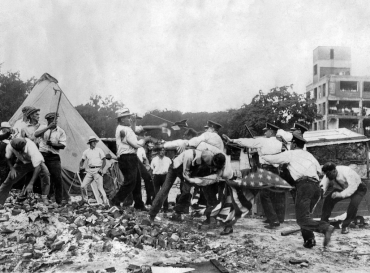
Many of the war veterans had been out of work since the beginning of the Great Depression. The World War Adjusted Compensation Act of 1924 had awarded them bonuses in the form of certificates they could not redeem until 1945. Each certificate, issued to a qualified veteran soldier, bore a face value equal to the soldier's promised payment with compound interest. The principal demand of the Bonus Army was the immediate cash payment of their certificates.
On July 28, 1932, U.S. Attorney General William D. Mitchell ordered the veterans removed from all government property. Washington police met with resistance, shot at the protestors, and two veterans were wounded and later died. President Herbert Hoover then ordered the U.S. Army to clear the marchers' campsite. Army Chief of Staff General Douglas MacArthur commanded a contingent of infantry and cavalry, supported by six tanks. The Bonus Army marchers with their wives and children were driven out, and their shelters and belongings burned.
 RSS Feed
RSS Feed